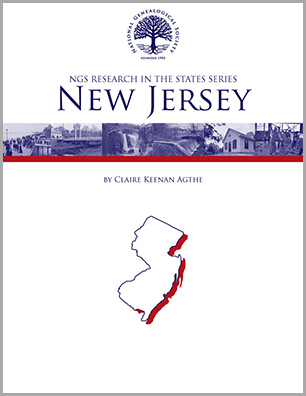 Prior to Europeans’ arrival in the New World, New Jersey was home to the Lenni-Lenape tribe. In the seventeenth century, a diverse population of Europeans began to settle in New Jersey. By 1800 its population included free African Americans, English, Finns, French, German, Irish, Scots, Scots-Irish, and Swedes along with smaller groups of Alsatians, Danes, Flemings, Walloons, and Welsh. Later, in the twentieth century, Italians and Hispanics migrated to the state.
Prior to Europeans’ arrival in the New World, New Jersey was home to the Lenni-Lenape tribe. In the seventeenth century, a diverse population of Europeans began to settle in New Jersey. By 1800 its population included free African Americans, English, Finns, French, German, Irish, Scots, Scots-Irish, and Swedes along with smaller groups of Alsatians, Danes, Flemings, Walloons, and Welsh. Later, in the twentieth century, Italians and Hispanics migrated to the state.
Research in New Jersey introduces family historians and genealogists to the wealth of records held by local, county, and state governments on all those who once lived in New Jersey.
Records include those dating back to New Sweden and New Netherland in the seventeenth century and continue on through the Vietnam War (1959-1975). The author provides an overview of the state’s major repositories, including the National Archives Regional Facilities, New Jersey State Archive, New Jersey State Library, and the Rutgers University: Alexander Library. The guidebook also discusses where researchers can find business, land, and vital records; naturalization, school, tax, and voter records; atlases, censuses, directories, gazetteers, and newspapers; and court records.
From colonial times, New Jersey welcomed religious diversity. Dutch Reformed, Episcopalians, Jews, Methodists, Presbyterian, Roman Catholics, and Quakers have all settled in the state. One section of Research in New Jersey provides extensive information about how to locate and explore religious records. In addition, ethnic research and military records are covered in depth.
Published by NGS, Research in New Jersey is one volume in the Research in the States series edited by Barbara Vines Little, CG, FNGS, FUGA, FVGS. It is available for purchase in the NGS online store in both PDF and print versions.

 Claire E. Keenan (formerly Claire Keenan Agthe), is a professional genealogist, author, and lecturer, specializing in New Jersey, Pennsylvania, New York, and Irish research. She is a vice president and trustee of the Genealogical Society of New Jersey.
Claire E. Keenan (formerly Claire Keenan Agthe), is a professional genealogist, author, and lecturer, specializing in New Jersey, Pennsylvania, New York, and Irish research. She is a vice president and trustee of the Genealogical Society of New Jersey.